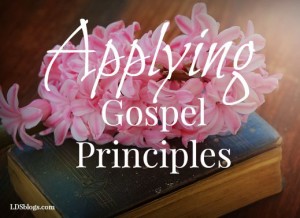I’ve taken a few gigantic leaps forward in understanding and honoring agency. Heavenly Father is really cool.
Philosopher Immanuel Kant grappled with great moral dilemmas and my boiled down version of his treatises is to “think from the standpoint of everyone else.” When really trying to understand another person’s choice, your capacity to see, understand, and create expands.
Agency—Consequence of Choice
I recently noticed that one aspect, of many, of agency that Heavenly Father honors is a consequence of choice. In other words, with my agency, I make choices and consequences ensue. Heavenly Father doesn’t charge in on a white horse with a drawn sword to “fix” the result. He trusts that the intelligence that made a choice can also fix, endure, enjoy the consequence.
 I’ve always been a fixer. When someone shares a circumstance with a problem, I immediately jump into fix-it mode. You can’t do that? Wait, if you do this, you can. Jump through this hoop. Approach it this way. And voila, you can do it. I’ve solved a lot of problems.
I’ve always been a fixer. When someone shares a circumstance with a problem, I immediately jump into fix-it mode. You can’t do that? Wait, if you do this, you can. Jump through this hoop. Approach it this way. And voila, you can do it. I’ve solved a lot of problems.
I also noticed that though I could find solutions to problems, people weren’t always eager to hear a solution. Sometimes people chose to stand in the problem. That confused me until I realized that I stood in my own problems quite regularly instead of solving them.
Rushing to solve another adult’s problem sometimes created a weird needy fix-it relationship. Our relationship wasn’t based on mutual respect and love, it was based on adrenaline rushes for charging in on the white horse with a drawn sword to save the day.
The patterns kept repeating themselves with them needing solutions. I lived in constant fight or flight mode.
Heavenly Father’s View
How does Heavenly Father react to people’s use of agency?
Wherefore, men are free according to the flesh; and all things are given them which are expedient unto man. And they are free to choose liberty and eternal life, through the great Mediator of all men, or to choose captivity and death, according to the captivity and power of the devil; for he seeketh that all men might be miserable like unto himself.
“All things are given them which are expedient.” In the cases I’m considering, that means that if I truly honor your agency, I believe that you can fix it because you have the capacity to do so. I’m available for help if you need it, otherwise, I support you best by offering my love and encouragement.
Problems and Solutions
 The Brother of Jared’s problem was darkness. He built boats as directed by the Lord. He noticed the boats lacked light. He went to the Lord for a solution. The Lord asked the Brother of Jared what he would like the Lord to do. The Brother of Jared found a solution and then asked the Lord for His help.
The Brother of Jared’s problem was darkness. He built boats as directed by the Lord. He noticed the boats lacked light. He went to the Lord for a solution. The Lord asked the Brother of Jared what he would like the Lord to do. The Brother of Jared found a solution and then asked the Lord for His help.
Gideon’s problem was self-confidence. He wanted a confirmation that the Lord called him to lead the people. He asked the Lord to make a fleece wet one night and then asked Him to make everything but the fleece wet the next night. The Lord responded.
Hannah’s problem was barrenness. She wanted a child and went to the temple to petition the Lord saying if He would give her a son, she would give the child back to the Lord. The Lord heard her cry and gave her an answer immediately through Eli the priest saying her prayer would be answered. She bore Samuel who, when weaned, lived at the tabernacle with Eli and became a great prophet-leader of the Israelites.
Abraham’s problem was lack of knowledge. He yearned for knowledge about the Priesthood, about God, about all things eternal. He studied and applied and obeyed and covenanted and approached God to be taught. Abraham fixed his gaze so completely on the things of God that he was taught and became the friend of God. “Abraham received all things, whatsoever he received, by revelation and commandment, by my word, saith the Lord, and hath entered into his exaltation and sitteth upon his throne.”
My favorite entry in the Bible Dictionary is Prayer. It teaches that Heavenly Father honors our agency so much that He waits until we ask Him for help, insight, blessings.
Prayer is the act by which the will of the Father and the will of the child are brought into correspondence with each other. The object of prayer is not to change the will of God but to secure for ourselves and for others blessings that God is already willing to grant but that are made conditional on our asking for them. Blessings require some work or effort on our part before we can obtain them. Prayer is a form of work and is an appointed means for obtaining the highest of all blessings.
Honoring Agency—Application Time
While learning this aspect of agency, my visiting teaching companion and I visited one of our ladies. She’d struggled with depression for a long time and lived in a very dark, dirty environment. She said she felt like a cleaner atmosphere would help her day-to-day outlook. We jumped right on that saying we would come over any day that week to help clean.
 We offered to arrange things so we could clean while she was at work—she said she felt overwhelmed by always having to take care of everything while other family members do nothing, so we thought this would enable her to just come home to a clean place. She said she felt shame about the house, but we’d already been in it, so she said she’d let us know.
We offered to arrange things so we could clean while she was at work—she said she felt overwhelmed by always having to take care of everything while other family members do nothing, so we thought this would enable her to just come home to a clean place. She said she felt shame about the house, but we’d already been in it, so she said she’d let us know.
Afterwards, I texted her asking when we could come clean. At church the next Sunday, I gave her our possible cleaning schedules for the following week. I knew we could fix this. It would be easy for us to do with immediate results for her. Nothing. I stepped back accepting her choice.
Later, we got a frantic text about the state conducting a surprise visit in her home. She was stressed about the home’s condition and telling us her plans to rush, rush, rush to make it look presentable. Still no desire to accept our offer.
While I read the texts, I just felt confused. Why wouldn’t she let us help? We couldn’t have been more eager or available. Why would she suffer through this on her own? Why would she choose that option?
Then the lesson. It was her choice. And because it’s her choice, I need to honor that choice. She’d been given tools to fix it. If I honor her agency, I concur she will “fix it” in the best way for her at the moment.
Choosing to Suffer or Not to Suffer
I’ve been given tools to fix everything, too. Why do I carry sorrows, griefs, limiting belief, burdens on my shoulders?
Jesus said,
Come unto me, all ye that labour and are heavy laden, and I will give you rest.
And if men come unto me I will show unto them their weakness. I give unto men weakness that they may be humble; and my grace is sufficient for all men that humble themselves before me; for if they humble themselves before me, and have faith in me, then will I make weak things become strong unto them.
Jesus Christ, our Savior, suffered for us. We do not have to suffer. But to suffer or not is ultimately our choice.
For behold, I, God, have suffered these things for all, that they might not suffer if they would repent;
But if they would not repent they must suffer even as I;
Which suffering caused myself, even God, the greatest of all, to tremble because of pain, and to bleed at every pore, and to suffer both body and spirit—and would that I might not drink the bitter cup, and shrink.
And so God stands at the ready while honoring our agency. He can see obvious ways to fix our problems, and will offer assistance as requested, but in all ways, He honors His gift of agency. If He believes in and honors me so much, that gives me faith and hope to believe in and honor Him and you, too.
I am a member of The Church of Jesus Christ of Latter-day Saints. I have moved 64 times and have not tired of experiencing this beautiful earth! I love the people, languages, histories/anthropologies, & especially religious cultures of the world. My life long passion is the study & searching out of religious symbolism, specifically related to ancient & modern temples. My husband Anthony and I love our bulldog Stig, adventures, traveling, movies, motorcycling, and time with friends and family.







